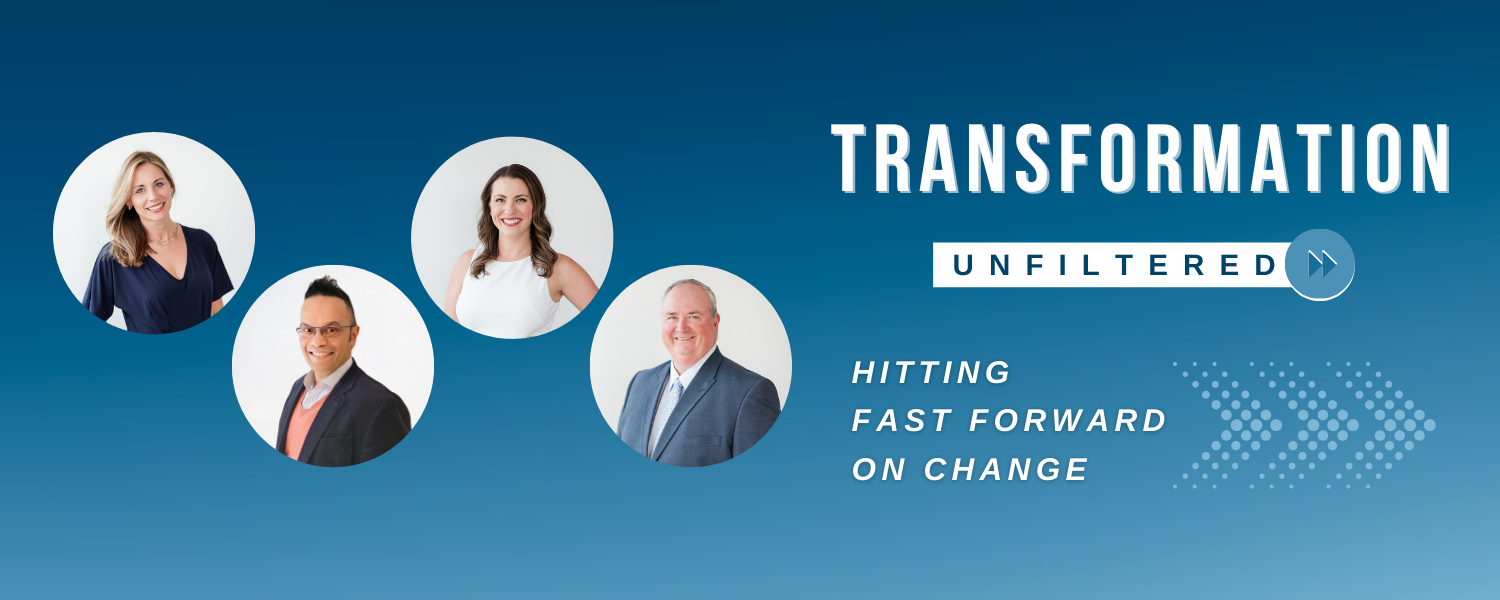Episode 24
When Quick Wins Backfire - How the Myth of the First 90 Days Gets us in Trouble
Summary:
D'Mar Phillips, VP of People and Culture at RS Americas joins Dr. Jim to discuss the myths surrounding the first 90 days in a new leadership role. Phillips shares insights from his career, emphasizing the importance of listening, observing, and learning before rushing into changes. He recounts a personal experience of misaligned expectations early in his career and how it shaped his leadership approach. The conversation explores building relationships and gaining trust within an organization, offering practical advice for aspiring leaders. Tune in to discover strategies for a successful transition into leadership roles with lasting impact.
Chapters:
0:00
Rethinking First 90 Days and Building Strong Workplace Culture
1:50
D'Mar Phillips on Leadership, Mistakes, and Personal Growth
3:36
Navigating Early Career Challenges and Leadership Expectations
6:59
Managing Emotions and Expectations in Workplace Conflicts
Building Trust and Relationships in Leadership Roles
The Impatience of Modern Life and Technological Advancements
Continuous Learning and Decision-Making in Leadership Roles
Listen, Look, and Learn: Leadership Advice for New Roles
Host Dr. Jim: linkedin.com/in/drjimk
Guest D'Mar Phillips: linkedin.com/in/dmarphillips
Executive Producer Jim Kanichirayil: linkedin.com/in/drjimk
Music Credit: "Lost in Dreams" by Kulakovka
Transcript
It doesn't have to be the whole organization at once. You break it down into small bite-sized, manageable pieces so that you're interacting with a specific group, a specific target area to be able to get feedback because everyone's problems aren't the same, but groups of problems might be similar, right?
And so you select that feedback, receive it, provide the feedback to the managers and the leaders within the organization, and that helps to build. A strong, thriving culture because you're able to root out some real problems that people on the surface probably aren't looking for.
Dr. Jim: what if [:We've been told that we need to make an immediate impression. What if all of those things that we've been told about our first 90 days really sets us up for some bad mistakes when they happen? When we look at today's conversation, we're gonna really look at whether it makes sense for us to hit fast forward during the first 90 days, or does it make more sense for us to slow down?
ure building initiatives. In [:He holds an MBA a Master of Science in Human Resources Management, and a Master's of Science and law. DeMar is also a certified senior professional in human resources and a senior certified professional outside of work. DeMar enjoys spending time with his family and friends, traveling, and is a passionate Dallas Cowboys fan. His proudest accomplishments are raising his daughter Kaya and his nephew Cavan,. He lives by Dr. Maya Angelo's. Quote, people will forget what you said. People will forget what you did, but people will never forget how you made them feel. DeMar, welcome [00:03:00] to the show.
D'Mar Phillips: Thank you so much, Dr. Jim. Thank you. Glad to be here.
Dr. Jim: Looking forward to this conversation. So let's jump right into it. What'd you screw up? Dammar?
D'Mar Phillips: I think like other professionals, especially new professionals getting into the industry, I try to come in and make a big impact immediately, which is one of the biggest myths of the first 90 days that you could fall into. And like everyone else I did I came into an organization that I started as the head of hr was given a big project and I worked night and day to make that project.
sed on by my predecessor who [:She had left the company. And I worked night and day to think I was making a great impression and turned it into him, and he thought I had lost my mind.
Dr. Jim: Let's dig into that a little bit. You did all that work, you turned it in and you got that response from your boss. What was going through your mind at the time?
D'Mar Phillips: I was the head of hr, the highest ranking HR person there at the time, but this was the executive vice president and co-owner of the company. And so when your boss is looking over his glasses peering at you saying. What the heck did you do? You're in sh one, in shock two.
I'd ever had, thinking I had [:Because I had went through the work and had done the work to research the things that needed to be in the handbook, done comparisons, looked at the writings, found mistakes that the lawyer had made, which is probably why she was no longer there. And wanted to be recognized for my hard working diligence.
And instead I got hit with a, what the heck are you doing? You're not a lawyer. Why would you change something that the lawyer had stated when the lawyer was factually wrong and incorrect? I had to reset pretty quickly. My, my emotional state and said, to him, Hey, I've done the work, I've done the research, I have documented my sources.
a situation where your boss. [:Dr. Jim: One of the things that I heard from. Your emotional state at the time. You mentioned that you had to process all this stuff all at once, and this is, one of your earliest leadership roles in HR and you've put in a lot of work and you've delivered a work product that you believe is pretty rock solid and you've documented everything there you get this feedback. And if it were me. I would've, the only time you can tell when I get mad is when my ears turned red and I would've been having a readed moment and gotten defensive in that moment and started defending my work. when you look at that time and you're processing all of this stuff and all of this effort all at once, were the things that you used in the moment to keep yourself from getting overly defensive?
Mar Phillips: That's a great [:But I also want to be authentic. So I embrace my emotion. I'm not gonna try to hide it or be something fake. So what I had to do was remove myself from that situation pleasantly got up. After the conversation was finished and just walked out I had to go back to my office, which was a nice office, I must say.
was an inferior or a rushed [:The work was the work, right? And I let that speak for itself. But getting up out of that situation holding my tongue. Which is tough at times. I think the higher up I get, the more quick that tongue comes out. So I have to watch it even more now than then. But earlier in your career you're probably going to try to remove yourself from that situation to prevent an escalation or prevent some negative consequence occurring based off of saying something that you would later wanna take back.
So the fumes, I'm sure this face and these looks and that steam was coming and I, my nose gets a little spread when I get a little upset. I'm sure others can relate, but, removing yourself from the situation is probably the most mature, emotionally intelligent thing you could do.
At the time, especially when it's with a boss,
. So you were able to remove [:D'Mar Phillips: Re respectfully, I will disagree. I think you always have the option to remove yourself, and I think it takes managerial courage, but it also takes understanding that, you're not a prisoner. To a company or to a position you're not you don't have to be loyal to someone just because they're your boss, and you always have that.
it back to expectations and [:So you can always be self-deprecating and say I apologize if I. Fully misunderstood your direction and guidance when you provided this project to me to complete. I thought it was on a timetable and I worked to meet those expectations. If there was something that I misunderstood, please help clarify and I'd be more than happy to take the work back.
ith your supervisor, whether [:There's never a wrong time to do that.
Dr. Jim: That's really good feedback. And I think the one thing that I would probably add on top of that, 'cause my default tends to be sarcastic. In nature. So I would probably add filters on top of what my default is so that you're not you're not putting things out there into the ether to make people look at you sideways.
So that's really good feedback. Having gone through that experience, were the major lessons that you took away from having that bomb dropped on you when you put in all that work? I.
esident of people, that's my [:I. Right. So hearing the voice of the customer, you hear marketing campaigns or sales or whatever group talk about the voice of the customer. In people, my voice of the customer is my employees, right? So taking time outta your day, whether it's over the first 30, 45 days to listen to the organization to hear.
What these low hanging fruit items are, right? Benefits and pay will always be there. So I even throw that out because that's a longer term. Project process to do. But I want to hear are there cultural things? Are there under curves that you aren't aware of? What is the culture, can you define it?
ply it. How do you apply the [:It's obviously ongoing, right? But I'm just trying to break down the first 90 to a hundred days. How do you apply what you've learned? What you've heard by looking at the policies, the processes, the procedures, and try to implement that. And so I take that as a number one is listen, look, and learn. Number two, you can't.
Underestimate the importance of relationships and relationships to me is a contact sport. You actually have to get up out of your office. You have to go down to the warehouse. If you have operation employees, you have to get out to your sales force, see where they're at, out with the customer doing sales.
n. You might have positional [:But what you do with that authority and what you do with that power while you're there. Asking people about their family, about their personal situations, understanding that you can talk to them about their family. How's the wife doing? How's the husband doing? How's the kids doing in school?
Having those personal things to help you to build those relationships is what's going to establish the rapport that you need to be able to later on, implement changes that people understand are supported by you, sponsored by you, but doesn't necessarily have to be communicated by you.
fast forward on some of your [:D'Mar Phillips: Oh, absolutely. So the speed of change is like the speed of trust, right? And so those two things that I just talked about, the listen, look, learn approach, and the relationships like. I've, that situation happened to me in 2013. It is 2025 now. And I have applied that same blueprint to any job that I've taken along the way.
And I've had a few, as you can tell from the bio that you read all great, amazing opportunities. But I've applied that same approach with every people organization that I have led and mentored and helped develop is that first you have to fully understand who your customer. Is, and you can never lose sight that we are the representatives of people.
ation. It doesn't have to be [:It doesn't have to be the whole organization at once. You break it down into small bite-sized, manageable pieces so that you're interacting with a specific group, a specific target area to be able to get feedback because everyone's problems aren't the same, but groups of problems might be similar, right?
And so you select that feedback, receive it, provide the feedback to the managers and the leaders within the organization, and that helps to build. A strong, thriving culture because you're able to root out some real problems that people on the surface probably aren't looking for.
sessions, that really adds a [:It's always, this talk and listening bit, it's never action. And the fact that you actually tied it into an action element of it I think that's really important in terms of when you're looking at overall employee morale and engagement. So really good stuff there. Want you to zoom out a little bit, I want you to think about this entire experience, and now I want you to speak to that person that's maybe 10, 15 years behind you maybe stepping into their first leadership role, I. advising them on what their approach should be over that first 90 days, first a hundred days, what are the things that they should be thinking about, and more importantly, how do they work back that level of urgency that they might have internally that, oh, I got my first big title. I need to prove myself.
What are, what's your advice to them?
d someone who was telling me [:And so I would say don't rush your destiny. Like typically we, we try to rush things. This is a very impatient world. We have iPhones information's right at our fingertips. We have copilot that can answer anything with us or chat GBT in seconds. And all the entertainment that we ever want is on our phone.
I don't have to go to the movies, I don't have to do the things that we used to do in my generation. I'm a Gen Xer towards the end but a Gen Xer. And so I didn't grow up the way that my daughter has grown up, right? With information just right there. I had to go to the library to do all these things.
be leading, be a student of [:And then when I find out that I'm the decision maker, those decisions become gray real quick. Not everything is black and white, and so you have to prepare yourself. For handling the thing that you don't wanna handle, if you're gonna pursue that role, so be a student of it. Understand what is the highest level of risk that could potentially come in My PO in my position, the loss of an employee, dealing with the death of the employee is something that my role would handle, right?
announcement. And so I would [:You listed off several different degrees and certifications that I have. That's part of continuous education, and it is a continuous thing that you need to do to be able to do the research, to understand so that you make informed opinions and decisions. Because I'm the last line of defense before decisions made.
So if it's the wrong thing, guess what? I'm right there with it and I have the ability to either influence it one way or the other. And so I would just challenge anyone regardless if you are in people side of things, regardless if you are, the CEO of a company, when those things hit my desk.
re the rubber meets the road [:Dr. Jim: Great stuff, DeMar. If people want to continue the conversation and get in touch with you, what's the best best way for them to do that?
D'Mar Phillips: yes, LinkedIn or email would be perfect.
ition in any new role should [:And I think when you bring it into. The real world. The reason why that's important is that every leadership book will teach you to seek to understand before trying to be understood.
D'Mar Phillips: Yeah.
Dr. Jim: application of how you actually bring that in, bring that to life. I. It can. This is the how, because we know if you don't do that, what happens, you are in a meeting with your SVP and the co-owner and they're looking at you asking you really uncomfortable questions and you might be stuck in a situation where you can't escape to regather.
efore you start doing stuff. [:


